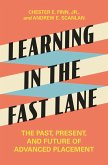"In the United States, education reform policy is a growing topic of national conversation and concern, especially surrounding the use of standardized testing. Research shows a large disparity exists in test scores between white, wealthy, and middle class students and students that are black or come from impoverished communities. This "achievement gap" is used by policymakers to justify that public education is in need of remediation - that public schools and teachers are failing to raise the test scores of students and schools should be privatized. However, it is a well-known fact in parts of the academic world that scores are clearly divided along lines of race and class. Studies have shown that this gap has existed for more than one hundred years, dating back to the eugenics movement in the early 1900s. Despite the ever-changing demographics of the US, high-stakes use of racialized tests scores are maintaining a social status quo of racial inequality. In an era that claims equity as its goal, there is a hidden story of inequity growing around public education and maintained by the very nature of the tests themselves. In An Illusion of Equity: The Legacy of Eugenics in Today's Education, author Wendy Z. Warren unpacks the origins of the tests and evaluates the inherent inequity of using standardized test scores as sole markers for academic achievement. Warren argues that relying only on test scores has dire social consequences by fostering highly racialized outcomes that privilege white and wealthy people while also denying outstanding students further educational opportunities. This author proposes to describe how our country has arrived at a place where a system of built-in advantage and oppression is spun and accepted as equitable. The premise of An Illusion of Equity is twofold: first, educational equity will never truly exist without social equity. Second, this equity will never exist as long as critical decisions are made based on standardized scores that are biased at their very core. By drawing from several disciplines, Warren will merge the creation of social hierarchy based on race and class and the history and process of test taking in order to shed new light on this issue. Warren's proposed book will closely analyze ETS Testing manuals, as well as books ax nd articles by scholars, and will include sections on how parents, educators, and policymakers can use their power to enact change in education policy"--








